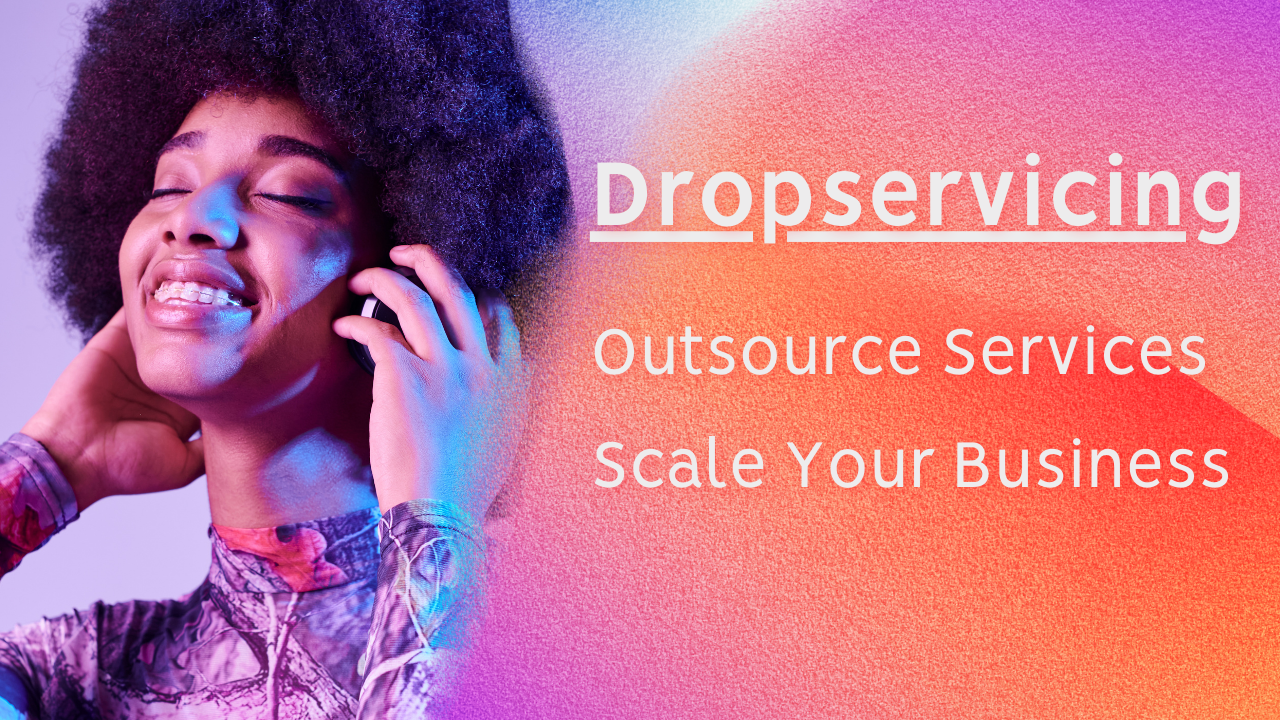
Dropservicing is a business model where you sell services without directly providing them yourself. Instead, you outsource the service delivery to freelancers or agencies, acting as the intermediary between the client and the service provider. This allows you to offer a wide range of services without the need to hire employees or possess specific skills.
How Does Dropservicing Work?
- Identify a Service: Choose a service in high demand, such as web design, social media marketing, content writing, virtual assistance, or graphic design.
- Find Service Providers: Source reliable freelancers or agencies on platforms like Fiverr, Upwork, Freelancer, or Guru.
- Market Your Services: Create a website, social media profiles, or run online ads to attract clients.
- Secure a Client: Once a client engages your services, you clearly define the scope of work and deliverables.
- Outsource the Work: Assign the project to a suitable freelancer or agency, providing them with the necessary instructions and client information.
- Oversee the Project: Monitor the project’s progress, ensure quality standards are met, and communicate with both the client and the service provider.
- Deliver Results: Once the project is completed, deliver the final product to the client and receive payment.
- Collect Your Profit: Deduct the service provider’s fees and any other expenses from the client’s payment to generate your profit.
Benefits of Dropservicing
- Low Startup Costs: Minimal upfront investment is required, as you don’t need to hire employees or maintain an office.
- Scalability: Easily scale your business by taking on more projects and collaborating with multiple service providers.
- Flexibility: Work from anywhere with an internet connection and set your own hours.
- Wide Range of Services: Offer a diverse range of services without requiring specialized skills or experience.
- No Employee Management: Avoid the complexities of hiring, training, and managing employees.
Challenges of Dropservicing
- Finding Reliable Service Providers: Identifying and vetting skilled and trustworthy freelancers can be time-consuming.
- Quality Control: Ensuring consistent quality across projects and maintaining client satisfaction can be challenging.
- Communication and Coordination: Effective communication and coordination between you, the client, and the service provider are crucial.
- Project Management: Managing project timelines, budgets, and deliverables requires effective project management skills.
- Competition: The dropservicing market is competitive, requiring you to differentiate yourself and build strong client relationships.
Getting Started with Dropservicing

- Choose a Niche: Select a specific service or niche with high demand and low competition. Consider your interests, skills, and target audience.
- Build Your Online Presence: Create a professional website or online portfolio to showcase your services and build credibility.
- Find Reliable Service Providers: Explore freelancing platforms, network with other entrepreneurs, and conduct thorough background checks on potential service providers.
- Develop a Pricing Strategy: Determine your service fees based on market rates, service provider costs, and desired profit margins.
- Market Your Services: Utilize various marketing channels, such as social media marketing, content marketing, search engine optimization (SEO), and paid advertising.
- Provide Excellent Customer Service: Respond promptly to client inquiries, address concerns effectively, and build strong client relationships.
- Continuously Improve: Regularly analyze your performance, gather client feedback, and identify areas for improvement to enhance your services and increase efficiency.
Tips for Success in Dropservicing
- Build Strong Client Relationships: Focus on building long-term relationships with clients by providing exceptional service and exceeding expectations.
- Develop a Clear Service Agreement: Create a detailed service agreement that outlines project scope, deliverables, timelines, payment terms, and responsibilities.
- Invest in Project Management Tools: Utilize project management tools like Asana, Trello, or Monday.com to streamline workflows, track progress, and improve communication.
- Stay Updated on Industry Trends: Keep abreast of the latest industry trends, emerging technologies, and best practices in your chosen niche.
- Provide Value-Added Services: Offer additional services, such as consulting, training, or ongoing support, to differentiate yourself from the competition.
Dropservicing Vs Dropshipping
Dropshipping and dropservicing are both business models that allow entrepreneurs to start with minimal upfront investment. However, they differ significantly in what they sell and how they operate.
Dropshipping
- Focus: Selling physical products.
- Process:
- You create an online store and list products from a supplier.
- A customer places an order on your store.
- You forward the order to the supplier.
- The supplier ships the product directly to the customer.
- Pros:
- Low startup costs
- No inventory to manage
- Wide range of products available
- Cons:
- Low profit margins
- High competition
- Reliance on suppliers
Dropservicing
- Focus: Selling services.
- Process:
- You create a service-based business and market your services.
- A customer hires you for a service.
- You outsource the service to a freelancer or another service provider.
- You deliver the completed service to the customer.
- Pros:
- Higher profit margins
- Less competition
- More control over service quality
- Cons:
- Requires finding reliable service providers
- Customer service can be challenging
Table summarizing the key differences between Dropshipping and Dropservicing
| Feature | Dropshipping | Dropservicing |
|---|---|---|
| Product/Service | Physical products | Services |
| Inventory | No inventory | No inventory |
| Fulfillment | Supplier ships directly to customer | Freelancer/service provider delivers service |
| Profit Margins | Generally lower | Generally higher |
| Competition | High | Lower |
| Control | Less control over product quality | More control over service quality Export to Sheets |
Related article : Shopify: E-commerce Dropshipping Platform
Which one is right for you?
- Choose dropshipping if:
- You enjoy marketing and selling products.
- You’re comfortable with lower profit margins.
- You want a wide range of product options.
- Choose dropservicing if:
- You have expertise in a particular service area.
- You’re looking for higher profit margins.
- You’re comfortable managing freelancers.
Ultimately, the best choice depends on your individual skills, interests, and business goals.
Conclusion
Dropservicing presents a compelling opportunity for entrepreneurs to build a profitable business with minimal upfront investment. By carefully selecting a niche, finding reliable service providers, and providing exceptional customer service, you can successfully navigate the challenges and capitalize on the benefits of this dynamic business model. Remember that continuous learning, adaptation, and a focus on client satisfaction are key to long-term success in dropservicing.
Related article : Complete guide to succeeding in print on demand in 2025





